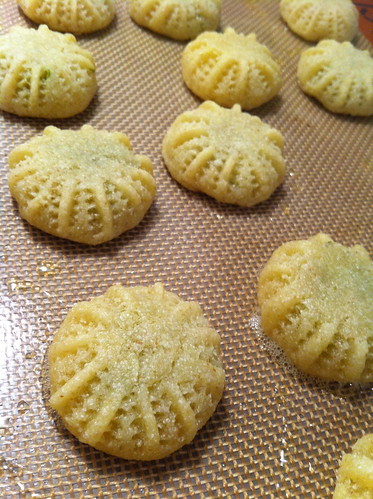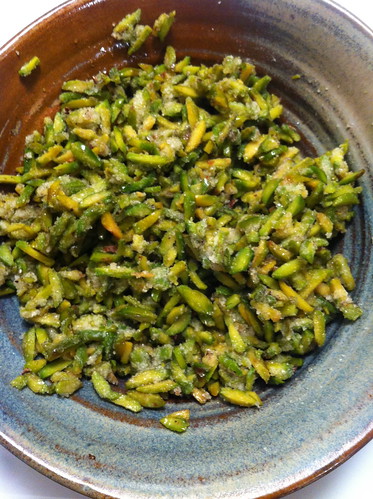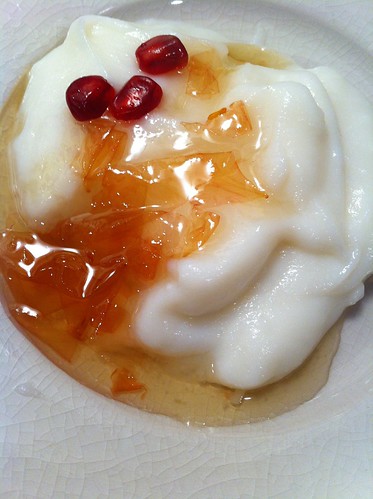Christmas in the Middle East
Despite globalization and Santa's great commercial success (and global take over) - Christmas in the Middle East (where it originated, let me remind you) has very different vibe than in Europe and North America. That's not to say that Santa and his reindeer do not make appearances here despite the alarming lack of snow (and sometimes no rainfall either). But it looks, sounds and smells different here, nevertheless.
Last week we went to the Christmas Market in Kfar Yassif (one of the largest Christian communities north of Haifa), with full-on expectations to have my Canadian standards of Christmas markets to be blown to bits. And to my delight, they did. First there is the reckless parking culture of the villages up north (parking is always a conundrum in big events, but we survived it quite heroically), and then there is the winter atmosphere of an Arab-Christian village in wintertime: lights everywhere, little children carrying light toys they purchased at the market, and street vendors selling boiled lupin and fava beans doused with cumin and lemon-salt (Middle Eastern street food is quite healthy), and sahleb (a warm, thickened milk beverage perfumed with rosewater, mastic resin and topped with spices and nuts).

Before you get into the market, you'll have security at the entrance (because any event of large crowds, especially that of a minority group, requires security in Israel, to remind you that something bad could happen at any moment but the army and police is there to protect you). And then there was lively and upbeat music - dumbak drums on the stage were performing Baladi beats by the town's square and the largest Christmas tree, later on succeeded by other performances such as a Middle Eastern violin musician, and more. And this pre-Christmas party was going to last till at least midnight, by the way. Proceeding to the market area, an overwhelming smell of barbecue filled the air - thick smoke of charcoals grilling meats of any kind (except perhaps turkey), including shrimps skewers. There were shawarma (aka donair) and felafel booths, and I think I've spotted some ma'amouls (fragrant and buttery semolina shortbread cookies filled with dates or nuts). There was absolutely none of the "Holiday Smells" such as eggnog or hot apple cider etc.
We circumvented the very crowded lineups and that's were we found the artisan stalls (there is a lovely new carpenter/woodworker in town that sold the most adorable ornaments, carved out of olive tree, some shaped like little guitars or oud - the musical instrument, not the incense tree); charity sales, and also those selling German-style mulled wine and green and red donuts (that look like they're made of plastic so of course we didn't eat them), and even something that looked like Japanese-style octopus pancakes next to stalls of chocolate syringes for chocaholics shooting up during Midnight Mass.

And speaking of mass - religious artifacts were offered as well lots and lots of incense was burnt. I don't think I've ever been to a Christmas market in Canada where frankincense and myrrh is openly burnt in cross-bearing copper censers! And keeping up with the syringe theme, there was the customary street-perfume-vendor stall, where perfume knock-off were sold out of large vats that make them give the illusion of precious cargo. The lady at that stall was advertising her wares by squirting cheap jus out of a large syringe (that is normally used to decant her merchandize into bottles for sale).

Around that time, we figured it would be a good moment to call it a night and go home with the loot we found - a little crocheted doily made by the local employment centre for adults with special needs, a bit clear helium bubble wrapped in lights, and the cheesiest Christmasy tiered tea tray, which for two years I've managed to avoid purchasing and always regretting I didn't...
And with this we'll close, but not before I'll give you recipes for a couple of regional sweets that are unique to the region around these holidays:
Ma'amoul Cookies Recipe

Ma'amoul are stuffed shortbread cookies from unsweetened dough, stuffed with dates or slightly sweetened nut fillings. The cookies originate in Jerusalem, but are popular all over the Middle East and each region has slightly different variation on the spices and dough recipe. For example: The nut fillings are usually walnut, but in Syria, where pistachios are abundant this is also a very popular and very elegant filling. The dough may be made from either fine semolina (cream of wheat), or from flour, or a mixture of both. Of course, the semolina ones are the best! They provide a rich, nutty and interesting texture to the cookie. In the Galilee, ma'amoul cookie dough is often flavoured with malepi (black cherry kernels), which give them a peculiar, inimitable aroma that goes especially well with the date filling (which, in turn, is likely to be spiced with cinnamon and cloves rather than the nutmeg in the recipe to follow).
The ma'amouls are shaped in multiple ways, in order to be able to differentiate between different stuffings. The shapes can also have other religious meanings, especially in the Christian communities - where this was originally an Easter pastry. The round ones are stuffed with dates, and signify the crown of thorns and Christ's suffering, and and the nut filled ma'amouls are oval-shaped, and said to symbolize Jesus' tomb.
The following recipe is adapted from May S. Bsisu's excellent book The Arab Table, p. 303-304; and some improvements based on Dokhol Safadi and Michal Waxman's book "Baladi: Four Seasons and Nazareth" (in Hebrew), p. 288-289. Naturally, I've added my own perfumey touch to the filling flavours and also my tips from many hours of rolling ma'amoul cookies with my adopted Syrian family.
Aside from the usual kitchen and baking equipment (large mixing bowl, chopping board, knife and large cookie sheets and baking paper), you'll also need one special piece of equipment, which is very easy to find in the Middle East but not so easy to come by outside of it: little metal clips that are made especially for pinching the decorations and marking the ma'amoul. Some books will also recommend specialty cookie molds. These are very pretty and make for great (and impressive) kitchen decoration, but I found them to be way more difficult to work with (the cookies get stuck in the molds).
But most importantly - this is not a task for one person. It is best to make ma'amoul (or any large amounts of hand-shaped pastries, especially stuffed ones) with company. I sometimes wonder if it's not the cooking together rather than the eating together that keeps people together.
Semolina dough:
4 cups fine semolina from Durum wheat, or regular sized semolina (AKA cream of wheat)
1.5 cups (3 sticks, or 375g) unsalted butter, melted
0.25 cup orange flower water
0.25 cup rosewater
0.5 cup unbleached all-purpose wheat flour
1 tsp freshly ground malepi (optional)
- Melt the butter and add the floral waters.
- Stir in the semolina until a dough is formed.
- Place in the fridge overnight, in order for the semolina to absorb all the moisture.
- The next day, mix the flour with the ground malepi (if desired).
- Knead the semolina dough with the flour mixture
- Roll into small balls (about the size of a golf-ball) and flatten them between your index finger and thumb. Place a small but significant amount of filling (about 1tsp) and close the dough in (it will look like a money pouch where all the dough gathers, this is the place you will place on the pan. The top will get the metal clips treatment, with decorations as imaginative as yourself.
- Bake in pre-heated oven (to 350F or 180c) for about 15min, or until slightly golden on the bottom.
- Let the cookies cool on a wire rack. Once cooled completely, sprinkle icing sugar on top. Keep as many as you're planning to eat within 2-3 days in a jar, so they don't turn stale. The rest are best to keep frozen. They will taste fresh once thawed again.
Date filling:
1lb pitted and mashed dates (see note below)
1.5 Tbs unsalted butter
1Tbs rosewater
1/4tsp grated nutmeg
* If you can't find pre-mashed dates, finely chop Barhi dates - the ones that are sold in small carton boxes and often mistakenly referred to as "fresh dates" in Persian and other Middle Eastern shops). If using pre-mashed dates (in vacuums package) be sure to remove any calyx or stem or occasional pit that were left behind).
Last week we went to the Christmas Market in Kfar Yassif (one of the largest Christian communities north of Haifa), with full-on expectations to have my Canadian standards of Christmas markets to be blown to bits. And to my delight, they did. First there is the reckless parking culture of the villages up north (parking is always a conundrum in big events, but we survived it quite heroically), and then there is the winter atmosphere of an Arab-Christian village in wintertime: lights everywhere, little children carrying light toys they purchased at the market, and street vendors selling boiled lupin and fava beans doused with cumin and lemon-salt (Middle Eastern street food is quite healthy), and sahleb (a warm, thickened milk beverage perfumed with rosewater, mastic resin and topped with spices and nuts).
Before you get into the market, you'll have security at the entrance (because any event of large crowds, especially that of a minority group, requires security in Israel, to remind you that something bad could happen at any moment but the army and police is there to protect you). And then there was lively and upbeat music - dumbak drums on the stage were performing Baladi beats by the town's square and the largest Christmas tree, later on succeeded by other performances such as a Middle Eastern violin musician, and more. And this pre-Christmas party was going to last till at least midnight, by the way. Proceeding to the market area, an overwhelming smell of barbecue filled the air - thick smoke of charcoals grilling meats of any kind (except perhaps turkey), including shrimps skewers. There were shawarma (aka donair) and felafel booths, and I think I've spotted some ma'amouls (fragrant and buttery semolina shortbread cookies filled with dates or nuts). There was absolutely none of the "Holiday Smells" such as eggnog or hot apple cider etc.
We circumvented the very crowded lineups and that's were we found the artisan stalls (there is a lovely new carpenter/woodworker in town that sold the most adorable ornaments, carved out of olive tree, some shaped like little guitars or oud - the musical instrument, not the incense tree); charity sales, and also those selling German-style mulled wine and green and red donuts (that look like they're made of plastic so of course we didn't eat them), and even something that looked like Japanese-style octopus pancakes next to stalls of chocolate syringes for chocaholics shooting up during Midnight Mass.
And speaking of mass - religious artifacts were offered as well lots and lots of incense was burnt. I don't think I've ever been to a Christmas market in Canada where frankincense and myrrh is openly burnt in cross-bearing copper censers! And keeping up with the syringe theme, there was the customary street-perfume-vendor stall, where perfume knock-off were sold out of large vats that make them give the illusion of precious cargo. The lady at that stall was advertising her wares by squirting cheap jus out of a large syringe (that is normally used to decant her merchandize into bottles for sale).
Around that time, we figured it would be a good moment to call it a night and go home with the loot we found - a little crocheted doily made by the local employment centre for adults with special needs, a bit clear helium bubble wrapped in lights, and the cheesiest Christmasy tiered tea tray, which for two years I've managed to avoid purchasing and always regretting I didn't...
And with this we'll close, but not before I'll give you recipes for a couple of regional sweets that are unique to the region around these holidays:
Ma'amoul Cookies Recipe

Ma'amoul are stuffed shortbread cookies from unsweetened dough, stuffed with dates or slightly sweetened nut fillings. The cookies originate in Jerusalem, but are popular all over the Middle East and each region has slightly different variation on the spices and dough recipe. For example: The nut fillings are usually walnut, but in Syria, where pistachios are abundant this is also a very popular and very elegant filling. The dough may be made from either fine semolina (cream of wheat), or from flour, or a mixture of both. Of course, the semolina ones are the best! They provide a rich, nutty and interesting texture to the cookie. In the Galilee, ma'amoul cookie dough is often flavoured with malepi (black cherry kernels), which give them a peculiar, inimitable aroma that goes especially well with the date filling (which, in turn, is likely to be spiced with cinnamon and cloves rather than the nutmeg in the recipe to follow).
The ma'amouls are shaped in multiple ways, in order to be able to differentiate between different stuffings. The shapes can also have other religious meanings, especially in the Christian communities - where this was originally an Easter pastry. The round ones are stuffed with dates, and signify the crown of thorns and Christ's suffering, and and the nut filled ma'amouls are oval-shaped, and said to symbolize Jesus' tomb.
The following recipe is adapted from May S. Bsisu's excellent book The Arab Table, p. 303-304; and some improvements based on Dokhol Safadi and Michal Waxman's book "Baladi: Four Seasons and Nazareth" (in Hebrew), p. 288-289. Naturally, I've added my own perfumey touch to the filling flavours and also my tips from many hours of rolling ma'amoul cookies with my adopted Syrian family.
Aside from the usual kitchen and baking equipment (large mixing bowl, chopping board, knife and large cookie sheets and baking paper), you'll also need one special piece of equipment, which is very easy to find in the Middle East but not so easy to come by outside of it: little metal clips that are made especially for pinching the decorations and marking the ma'amoul. Some books will also recommend specialty cookie molds. These are very pretty and make for great (and impressive) kitchen decoration, but I found them to be way more difficult to work with (the cookies get stuck in the molds).
But most importantly - this is not a task for one person. It is best to make ma'amoul (or any large amounts of hand-shaped pastries, especially stuffed ones) with company. I sometimes wonder if it's not the cooking together rather than the eating together that keeps people together.
Semolina dough:
4 cups fine semolina from Durum wheat, or regular sized semolina (AKA cream of wheat)
1.5 cups (3 sticks, or 375g) unsalted butter, melted
0.25 cup orange flower water
0.25 cup rosewater
0.5 cup unbleached all-purpose wheat flour
1 tsp freshly ground malepi (optional)
- Melt the butter and add the floral waters.
- Stir in the semolina until a dough is formed.
- Place in the fridge overnight, in order for the semolina to absorb all the moisture.
- The next day, mix the flour with the ground malepi (if desired).
- Knead the semolina dough with the flour mixture
- Roll into small balls (about the size of a golf-ball) and flatten them between your index finger and thumb. Place a small but significant amount of filling (about 1tsp) and close the dough in (it will look like a money pouch where all the dough gathers, this is the place you will place on the pan. The top will get the metal clips treatment, with decorations as imaginative as yourself.
- Bake in pre-heated oven (to 350F or 180c) for about 15min, or until slightly golden on the bottom.
- Let the cookies cool on a wire rack. Once cooled completely, sprinkle icing sugar on top. Keep as many as you're planning to eat within 2-3 days in a jar, so they don't turn stale. The rest are best to keep frozen. They will taste fresh once thawed again.
Date filling:
1lb pitted and mashed dates (see note below)
1.5 Tbs unsalted butter
1Tbs rosewater
1/4tsp grated nutmeg
* If you can't find pre-mashed dates, finely chop Barhi dates - the ones that are sold in small carton boxes and often mistakenly referred to as "fresh dates" in Persian and other Middle Eastern shops). If using pre-mashed dates (in vacuums package) be sure to remove any calyx or stem or occasional pit that were left behind).
Walnut filling:
2 cups walnuts
2 Tbs sugar
2 Tbs unsalted butter, melted
1 Tbs orange flower water
1 tsp cinnamon, ground 
Pistachio filling:
0.75 cups raw pistachios (unshelled)
2 Tbs sugar
2 Tbs unsalted butter, melted
1 Tbs orange flower water
0.5 tsp cardamom, freshly ground
Stay tuned for additional Middle Eastern Christmas specialty from my region, including Pumpkin Jam!






